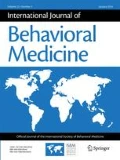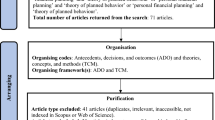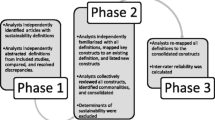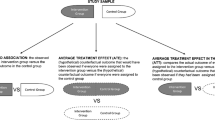Abstract
Background
The use of financial incentives or pay-for-performance programs for health care providers has triggered emerging interest in the use of financial incentives for encouraging health behaviour change.
Purpose
This paper aims to identify key conditions under which the use of financial incentives for improvements in public health outcomes is most likely to be effective and appropriate.
Methods
We review recent systematic reviews on their effectiveness in changing health behaviour and identify existing moral concerns concerning personal financial incentives.
Results
Current evidence indicates that incentives can be effective in driving health behaviour change under certain provisos, while a number of misgivings continue to be deliberated on. We outline a number of key principles for consideration in decisions about the potential use of incentives in leading to public health improvements.
Conclusion
These key principles can assist policy makers in making decisions on the use of financial incentives directed at achieving improvements in public health.
Similar content being viewed by others
References
Volpp KG, Pauly MV, Loewenstein G, Bangsberg D. P4P4P: an agenda for research on pay-for-performance for patients. Health Aff. 2009;28(1):206–14.
Petry NM. A comprehensive guide to the application of contingency management procedures in clinical settings. Drug Alcohol Depend. 2000;58:9–25.
Prendergast M, Podus D, Finney J, Greenwell L, Roll J. Contingency management for treatment of substance use disorders: a meta-analysis. Addiction. 2007;101:1546–60.
Greene J. Medicaid efforts to incentivize healthy behaviours. New Jersey: Center for Health Care Systems; 2007.
Fernald L, Gertler P, Neufeld L. Role of cash in conditional cash transfer programmes for child health, growth and development: an analysis of Mexico’s Oportunidades. Lancet. 2008;371:828–37.
Report of the Expert Panel for the Children’ Fitness Tax Credit. Ottawa, Ontario: Department of Finance Canada; 2006.
The Royal Australian College of General Practitioners (RACGP). Immunisation position paper. Melbourne, Vic.: RACGP; 2003.
Gray M, Qu L, Weston R. Fertility and family policy in Australia. Canberra, Australia: Australian Instititute of Family Studies; 2006.
Lussier JP, Heil SH, Mongeon JA, Badger GJ, Higgins ST. A meta-analysis of voucher-based reinforcement therapy for substance use disorders. Addiction. 2006;101(2):192–203.
National Preventative Health Taskforce. Tobacco control in Australia: making smoking history; 2009.
Marteau TM, Ashcroft RE, Oliver A. Using financial incentives to achieve healthy behaviour. BMJ. 2009;338:1415.
Cahill K, Perera R. Competitions and incentives for smoking cessation. Cochrane Database of Systematic Reviews; 2008(Issue 3).
Leeks KD, Hopkins D, Soler R, Aten A, Chattopadhyay S. Worksite-based incentives and competitions to reduce tobacco use. A systematic review. American Journal of Preventive Medicine. 2010;38:S263–S74.
Jochelson K. Kicking bad habits. Paying the patient. Improving health using financial incentives. London, UK.: King’s Fund; 2007.
Sutherland K, Leatherman S, Christianson J. Paying the patient: does it work? A review of patient-targeted incentives. London: QQUIP. Quest of Quality and Improved Performance. The Health Foundation; 2008.
Scott A, Schurer S. Financial incentives, personal responsibility and prevention. Canberra: Discussion paper commissioned by the National Health and Hospitals Reform, Australian Government; 2008.
Lagarde M, Haines A, Palner N. Conditional cash transfers for improving uptake of health interventions in low- and middle-income countries. JAMA. 2007;298(16):1900–10.
Fiszbein A, Schady N. Conditional cash transfers. Reducing present and future poverty. Washington, D.C.: The World Bank; 2009.
Paul-Ebhohimhen V, Avenell A. Systematic review of the use of financial incentives in treatments for obesity and overweight. Obesity Reviews. 2008;9:355–67.
Volpp KG, Troxel AB, Pauly MV, Glick HA, Puig A, Asch DA, et al. A randomized, controlled trial of financial incentives for smoking cessation. N Engl J Med. 2009;360:699–709.
Heil S, Higgins S, Bernstein I, Soloman L, Rogers R, Thomas C, et al. Effects of voucher-based incentives on abstinence from cigarette smoking and feral growth among pregnant women. Addiction. 2008;103:1009–18.
Volpp KG, John L, Troxel A, Norton L, Fassbender J, Lowenstein G. Financial incentive-based approaches for weight loss. A randomised trial. JAMA. 2008;300:2631–37.
Higgins S, Heil S, Soloman L, Plebani Lussier J, Abel R, Lynch M, et al. A pilot study on voucher-based incentives to promote abstinence from cigarette smoking during pregnancy and postpartum. Nicotine & Tobacco Research. 2004;6:1015–20.
Preston K, Umbricht A, Epstein D. Abstinence reinforcement maintenance contingency and one-year follow-up. Drug and Alcohol Dependence. 2002;67:125–37.
Roll J, Huber A, Sodano R, Chudzynski J, Moynier E, Shoptaw S. A comparison of five reinforcement schedules for use in contingency management-based treatment of methamphetamine abuse. The Psychological Record. 2006;56:67–81.
Thaler RH, Sunstein CR. Nudge. Improving decisions about health, wealth and happiness. Camberwell, Australia: Penguin Books; 2009.
Marteau TM, Oliver A, Ashcroft RE. Changing behaviour through state intervention. When does an acceptable nudge become an unacceptable shove? BMJ. 2009;338:121–2.
Kahneman D, Tversky A. Prospect theory: an analysis of decision under risk. Econometrica. 1979;47:263–91.
Vlaev I, Dolan P. From changing cognitions to changing the context: a dual-route model of behaviour change/. London: Imperial College London Business School; 2009.
Dolan P, Hallsworth M, Halpern D, King D, Vlaev I. MINDSPACE. Influencing behaviour through public policy. United Kingdom.: Institute for Government,; 2010; Available from: www.instituteforgovernment.org.uk
Klein E, Karlawish J. Challenges and opportunities for developing and implementing incentives to improve health-related behaviours in older adults. Journal of American Geriatrics Society. 2010;58:1758–63.
Deci EL, Koestner R, Ryan RM. A meta-analytic review of experiments examining the effects of extrinsic rewards on intrinsic motivation. Psychological Bulletin. 1999;125:627–68.
Frey B, Jegen R. Motivation crowding theory. Journal of Economic Surveillance. 2001;15:590–611.
Ryan R, Deci E. Self-determination theory and the facilitation of intrinsic motivation, social development, and well-being. American Psychologist. 2000;55:68–78.
Lee W, Reeve J, Xue Y, Xiong J. Similarities and differences in the neural activities of intrinsic motivation and incentive motivation. NeuroImage. 2009;47(Supplement 1):S39–41.
McDonald R, Harrison S, Checkland K, Campbell S, Roland M. Impact on financial incentives on clinical autonomy and internal motivation in primary care: ethnographic study. BMJ. 2007;334(7608):1357–62.
Dworkin G. Taking risks, assessing responsbility. The Hastings Center Report. 1981;11:26–31.
Wikler D. Who should be blamed for being sick? Health Education Quarterly. 1987;14:11–25.
Long JA, Helweg-Larsen M, Volpp KG. Patient opinions regarding ‘pay for peformance for patients’. J Gen Intern Med. 2008;23(10):1647–52.
Lynagh M, Bonevski B, Symonds I, Sanson-Fisher RW. Paying pregnant women to quit smoking during pregnancy? Acceptability among pregnant women. Nicotine & Tobacco Research. 2011:(in press).
Malotte CK, Rhodes F, Mais KE. Tuberculosis screening and compliance with return for skin test reading among active drug users. Am J Public Health. 1998;88:792–6.
Ghitza U, Epstein D, Schmittner J, Vahabzadeh M, Lin JL, Preston K. Effect of reinforcement probabilty and prize size on cocaine and heroin abstinence in prize-based contingency management. Journal of Applied Behaviour Analysis. 2008;41:539–49.
Higgins S, Badger G, Budney A. Initial abstinence and success in achieving longer-term cocaine abstinence. Exp Clin Psychopharmacol. 2000;8:377–86.
Petry N, Casarella T. Excessive discounting of delayed rewards in substance abusers with gambling problems. Drug and Alcohol Dependence. 1999;56:25–32.
Author information
Authors and Affiliations
Corresponding author
Rights and permissions
About this article
Cite this article
Lynagh, M.C., Sanson-Fisher, R.W. & Bonevski, B. What’s Good for the Goose is Good for the Gander. Guiding Principles for the Use of Financial Incentives in Health Behaviour Change. Int.J. Behav. Med. 20, 114–120 (2013). https://doi.org/10.1007/s12529-011-9202-5
Published:
Issue Date:
DOI: https://doi.org/10.1007/s12529-011-9202-5




